MRRL Hall of Fame
PARLIAMENT - FUNKADELIC
- Details
- Category: Inductees
- Created: Wednesday, 26 June 2013 07:36
- Written by Gary Johnson
George Clinton revolutionized R&B music during the 1970’s. Recording as both Parliament and Funkadelic, Clinton helped soul music evolve into funk by blending in diverse elements of late 60’s heroes like Jimi Hendrix, Frank Zappa, and Sly Stone into a stew that was uniquely his own. The Parliament and Funkadelic tandem ruled black music in the 1970’s, charting over 40 hits on the Billboard R&B chart (including three # 1 hits) and recording three platinum albums.
Clinton was born in Kannapolis, North Carolina, on July 22, 1941. After moving to Plainfield, New Jersey, Clinton became interested in doo wop through the recordings of The Teenagers, featuring lead singer Frankie Lymon, and formed a vocal group while in high school.
As soon as Clinton got out of school, he found a job in a barbershop. Clinton explained the reason to Uncut magazine in 2013; “The ‘in’ thing then was processing, that’s straightening hair. You chemically straighten the kinks and the naps out of it - you kill it in other words – then you can style it, pompadours and things; finger-curl it like Sugar Ray Robinson, Nat ‘King’ Cole, Jackie Wilson, all the singers in the 50’s and 60’s. Little Richard, Little Anthony, they all had the big pomps.”
Clinton was a hair stylist at Newark’s Uptown Tonsorial Parlor. Located in a predominantly black neighborhood, the shop was the hangout for both the young and the old. Clinton soon became known for his hair-styling abilities and later bought his own shop, as he told Uncut; “I made a thousand dollars a week processin’ hair. There were so many people got their hair done at $5 a head. I had a shop with 13 chairs, nine or ten barbers working for me. We had Cadillacs and shit – I didn’t know how to drive, but we was making so much money!”
He was also making a name with his musical talents. Along with a few friends and co-workers, Clinton would regularly belt out doo wop tunes to the delight of the customers. At first it was just a fun hobby, but the boys soon found themselves harmonizing in the back room, long after the shop had closed. “We’d rehearse in the barbershop”, Clinton recalled, “It was the only business that’d allow you to leave when you had to play a gig, or go to New York to try to hustle a record. Your customers was rootin’ for you, so long as you did their hair before you left”.
Clinton soon left the Uptown to start work at the Silk Palace, a barber shop in Plainfield, where he started recruiting a few local singers for his burgeoning group and focused his musical ambitions by putting together a quintet. He named his vocal group The Parliaments, after a popular brand of cigarettes marketed by Phillip Morris that had a distinctive recessed paper filter.
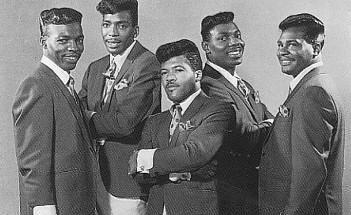 The Parliaments (George Clinton far right)
The Parliaments (George Clinton far right)
Besides being the leader of The Parliaments, Clinton was also the group’s manager. The classic lineup of the group included Clinton, Ray Davis, Fuzzy Haskins, Calvin Simon, and Grady Thomas. The Parliaments recorded their debut single, “Poor Willie” b/w “Party Boys” in 1958 on Apt, the label that had a # 1 hit with “Little Star” by The Elegants the same year. “Poor Willie didn’t chart; and in 1959, The Parliaments signed with Flip Records and released another non-charting single, “Lonely Island” b/w “(You Made Me Wanna) Cry”.
In the 1960’s, Clinton began working as a songwriter/producer for Jobete Music, the publishing company of Motown Records. The Parliaments did not release any recordings for Motown, as the label was completely occupied with its roster of hit male vocal groups including The Miracles, The Four Tops, and The Temptations. On his weekends off from the Silk Palace, which he now owned, Clinton would travel from Plainfield to Detroit to produce recording sessions.
When nothing developed at Motown, Clinton signed The Parliaments to Ed Wingate’s Golden World Records. Clinton had met Sidney Barnes in New York in 1962, and joined both Barnes and Mike Terry to form the Geo-Si-Mik production company as co-producers for Golden World. One of the trio’s first productions was “That Was My Girl” b/w “Heart Trouble” in 1966 by The Parliaments. Funk Brother Joe Hunter was one of the arrangers on both of the songs.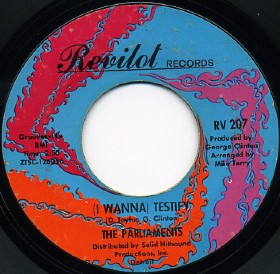 "(I Wanna) Testify" 45
"(I Wanna) Testify" 45
After Golden World ceased making records at the end of 1966, The Parliaments and the Geo-Si-Mik production team signed with Revilot Records, a Detroit label started by Lebaron Taylor (a.k.a. Tolliver) in 1966. The first Parliaments’ single for the label was their biggest hit, “(I Wanna) Testify” b/w “I Can Feel The Ice Melting”. “(I Wanna) Testify” was released in the summer of 1967 and peaked at # 3 R&B and # 20 Pop on the Billboard charts. In reality, Clinton was the only member of the group to appear on “Testify”, as the other Parliaments were unable to travel to Detroit for the recording; and as a result, local session singers and musicians rounded out the hit recording.
Following the success of “(I Wanna) Testify”, all of the Parliaments quit their jobs in New Jersey and relocated to Detroit, including Clinton who sold the Silk Palace. To capitalize on the single, Clinton put together a backing band and went on to tour the country. The expanded Parliaments now consisted of the five singers plus five backing musicians, including Bill ‘Bass’ Nelson and Eddie Hazel on lead guitar.
The Parliaments would go on to record five more singles for Revilot , but the relationship between Clinton and the label disintegrated during a disagreement over money. Although the group was still under contract, they refused to record any more material for Revilot. Many of the tunes that The Parliaments waxed for the Detroit label would later be re-recorded on later Parliament and Funkadelic albums. These included not only “Testify”, but also “I Can Feel The Ice Melting”, “All Your Goodies Are Gone”, “Good Ole Music”, “What You Been Growing”, “I’ll Wait”, and “That Was My Girl”. 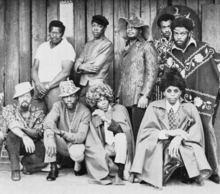 Parliaments 1969
Parliaments 1969
In 1969, Revilot filed for bankruptcy, thereby involving the band in a host of legal problems. Since the band could not legally bill itself as The Parliaments, they decided to carry on under a different name. Bill Nelson suggested Funkadelic as a name for the backing band, allowing them to sign with a different record label even though the music would still feature Clinton and the other four singers. Influenced by the music of Jimi Hendrix and Sly Stone, as well as the heavy Detroit rock bands like the MC5, Funkadelic became a raw guitar-based funk band with heavy psychedelic rock influences.
The band signed to Westbound Records and released their self-titled debut album, “Funkadelic”, in 1970. The album was a Billboard R&B hit, peaking at # 8, and produced two Top 40 R&B singles, “I Bet You” and “I Got A Thing, You Got A Thing, Everybody’s Got A Thing”. 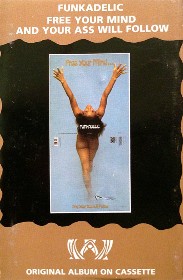
Later in 1970, Funkadelic released the “Free Your Mind…And Your Ass Will Follow” album that reached # 11 on the R&B chart and provided them with another Top 40 single, “I Wanna Know If It’s Good For You”. The band reportedly recorded the entire album under the influence of L.S.D. The record was engineered by Norman Whitfield, but he was not credited because of his ties to Motown. Clinton told Uncut that Whitfield also taped some Funkadelic performances at the 20 Grand night club in Detroit and used some of the ideas in several of the psychedelic soul records that he wrote and produced for The Temptations, including the hits “Ball Of Confusion”, “Psychedelic Shack”, and “Cloud Nine”.
Meanwhile, Clinton had regained the rights to the name Parliaments in 1970, and he signed the group to Invictus Records, the second label established in Detroit by Holland-Dozier-Holland after they left Motown. The Parliaments recorded three singles on Invictus; the first under the name ‘A Parliament Thang’ and the last two as ‘Parliament’. Strangely enough, the song “Little Ole Country Boy” was issued on all three singles, as the A-side on the first and then as the B-sides on the final two.
Parliament recorded the “Osmium” album for Invictus in 1970. Clinton claimed in Uncut: “It was way off of line for a black group; it was way off of line for a white group; we did all kind of styles on it – country, bagpipes…it was like a Beatles record!” Parliament would go on a three-year hiatus after leaving Invictus, during which Clinton concentrated on recordings done under the Funkadelic banner. 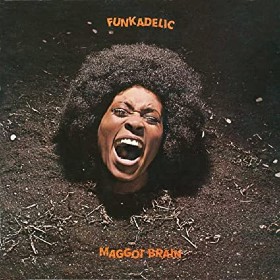 "Maggot Brain" album
"Maggot Brain" album
Funkadelic’s, “Maggot Brain” LP from 1971 was the first release to feature contributions from keyboardist Bernie Worrell . Several new members helped make the album one of Funkadelic’s most diverse records, and it reached # 14 on the Billboard R&B album chart. Subsequent releases, 1972’s “America Eats Its Young” and 1973’s “Cosmic Slop”, were also respectable R&B chart hits.
In 1974, Clinton signed Parliament to Casablanca Records. The first album release for their new label was the # 17 R&B hit, “Up For The Down Stroke”. The title cut was released as a single and it reached # 10 R&B, the band’s biggest single since “(I Wanna) Testify” in 1967. 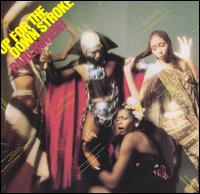 "Up For The Down Stroke"
"Up For The Down Stroke"
As the original ten-member band of Parliament-Funkadelic began to splinter, more new members, such as Bootsy Collins, Gary Shider, and the Horny Horns joined on to form a collective with a fluid and rapidly expanding membership. During the period from 1975 to 1979, both Parliament and Funkadelic achieved several high-charting albums and singles. Parliament’s “Mothership Connection” was certified platinum after hitting # 4 and # 13 on the R&B and Pop charts. It is also thought to be the most sampled album of all time thanks to mighty grooves like “P-Funk (Wants To Get Funked Up)” and the introduction of horn players Fred Wesley and Maceo Parker from James Brown’s JBs. A single from the LP, “Give Up The Funk (Tear The Roof Off The Sucker)”, became the band’s first 45 to earn a gold record.
Parliament continued the hit albums with “The Clones Of Dr. Funkenstein” in 1976. The # 1 R&B hit “Funkentelechy Vs. The Placebo Syndrome” was the next release in 1977. Parliament LPs had become concept albums with themes dealing with science fiction and elaborate political and sociological viewpoints. “Funkentelechy..”, which dealt with the dangers of consumerism and disco, contained the hit single “Flash Light”, along with other great P-Funk grooves like “Bop Gun”.
Funkadelic also crossed over to the Pop charts in 1978 with the “One Nation Under A Groove” album. It was the band’s biggest LP, reaching # 1 R&B and # 16 Pop while achieving platinum sales. The title track was a big hit single, peaking at # 1 and becoming Funkadelic’s first Top 40 Pop hit of their career. 1979’s “Uncle Jam Needs You” continued their momentum with a # 2 R&B hit and another # 1 R&B single with “(Not Just) Knee Deep”. The song also charted at # 18 on Billboard’s Hot 100. 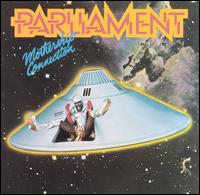 "Mothership Connection" LP
"Mothership Connection" LP
During the 70’s, the collective began touring as Parliament-Funkadelic. The stage shows, particularly the P-Funk Earth Tour of 1976, were expanded to include imagery from science fiction and used a large spacecraft stage prop called the’ Mothership’. The prop has since been donated to the Smithsonian in the part of the museum dedicated to the African-American experience and will contain a great deal of memorabilia from black music and art. The new building is set to open in 2015.
Many members of the collective had also begun to branch off into side bands and solo projects under George Clinton’s tutelage. These included Bootsy’s Rubber Band, Parlet, and the Brides of Funkenstein, along with solo projects from longtime member Eddie Hazel.
Unfortunately, by the end of the decade things started to unravel. The collective was overextended by the numerous releases, and several key members left over disagreements with Clinton over both his management style and well-documented drug problems. Although Parliament recorded three more hit albums on Casablanca, the collapse of the label in the early 80’s led to financial difficulties that caused Clinton to dissolve Parliament and Funkadelic as separate entities.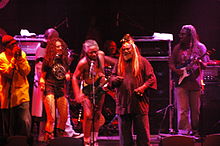 Parliament-Funkadelic
Parliament-Funkadelic
By the early 80’s, Clinton began releasing solo projects with the help of those who remained in the collective. 1982’s “Computer Games” would be Clinton’s last big hit, reaching # 3 R&B and # 40 Pop on the album charts. “Atomic Dog”, taken from the album, would be his last # 1 R&B single.
Clinton and many of the Parliament-Funkadelic members continued to tour and record throughout the 80’s as the P-Funk All Stars, but the decade’s disdain of everything to do with the 70’s resulted in critical and commercial neglect for the world’s biggest funk band. Complicating things further, Clinton became embroiled in more legal difficulties during a three-year period from 1986 to 1989 over myriad royalty problems involving his recordings of the 70’s that featured over 40 musicians on four labels, under three different names. 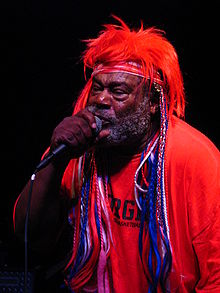 George Clinton
George Clinton
The early 90’s saw the rise of P-Funk-inspired rap music from the likes of Dr. Dre and the Digital Underground. Funk rock from bands like Red Hot Chili Peppers and Primus also helped re-establish the status of Clinton and P-Funk as important forces in the history of black music. In 1997, Parliament/Funkadelic was inducted into the Rock and Roll Hall of Fame. Sixteen P-Funk members were inducted at the ceremony – the most from one band ever to be inducted at the same time.
In 2012, George Clinton was awarded an Honorary Doctorate of Music from the renowned Berklee College of Music. Clinton is still battling record companies over royalties and copyrights to Parliament-Funkadelic music that has been sampled over the years. He also has a reality television show in the works that will deal with his ongoing legal struggles.
Parliament-Funkadelic was voted into the Michigan Rock and Roll Legends online Hall of Fame in June, 2013.
MRRL Hall of Fame: https://www.michiganrockandrolllegends.com/mrrl-hall-of-fame
Listen to Parliament-Funkadelic's "Give Up The Funk (Tear The Roof Off The Sucker)" https://www.youtube.com/watch?v=gBWH3OWfT2Y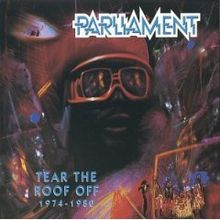
Dr. J. Recommends: There is a lot to choose from in the Parliament-Funkadelic catalog; but the two best individual albums are 1975's "Mothership Connection" by Parliament and 1978's "One Nation Under A Groove" by Funkadelic. If you want to go the greatest hits route, the best of the bunch is the 2 CD Parliament collection: "Tear The Roof Off 1974-1980". It offers the 25 of the best examples of P-Funk's psychedelic funk genius.
